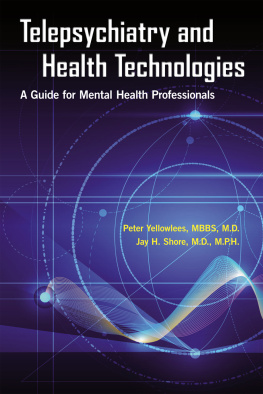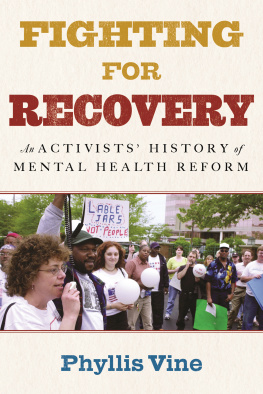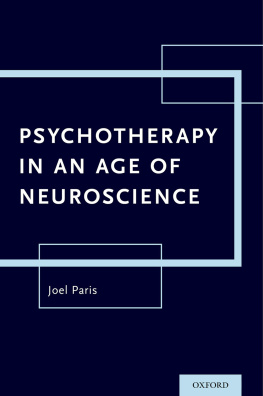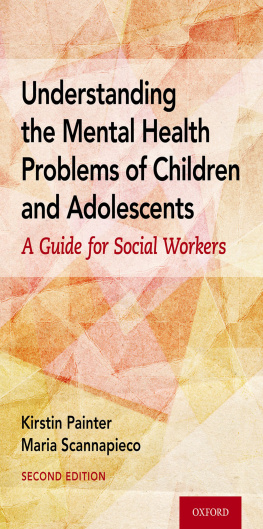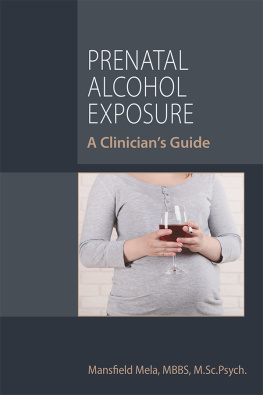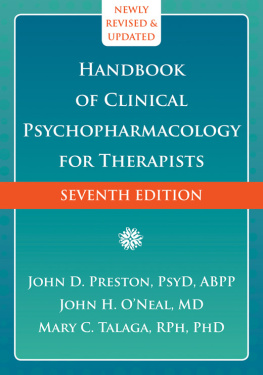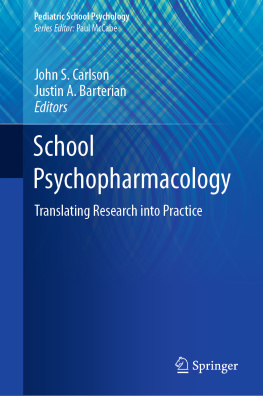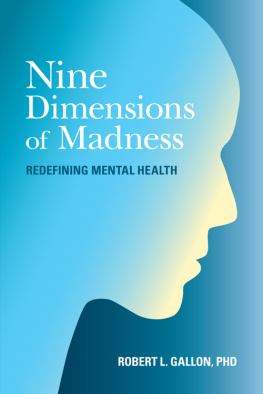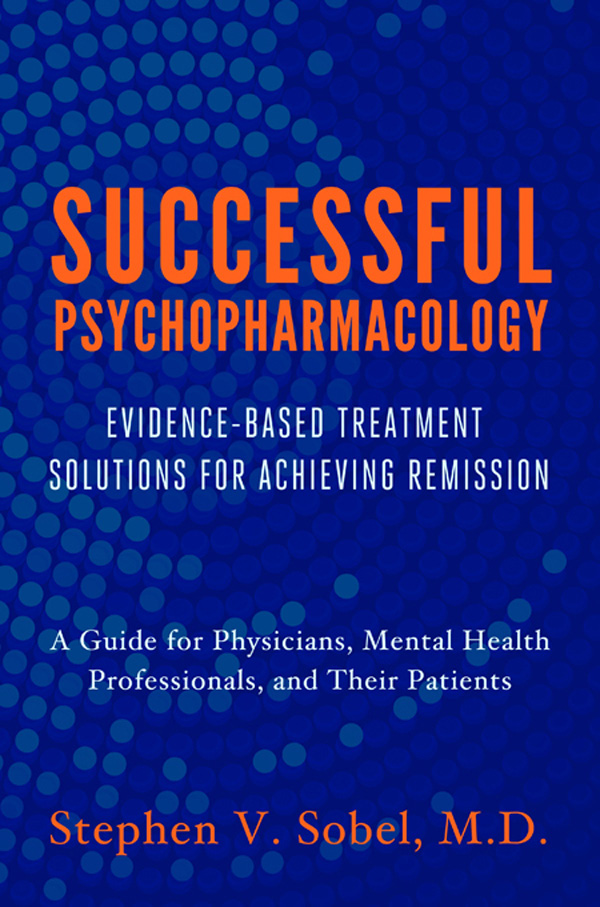
A Norton Professional Book
Successful
Psychopharmacology
Evidence-Based
Treatment Solutions
for Achieving Remission

Stephen V. Sobel

W. W. Norton & Company
New York London
Dedication

To Marilyn and Martin Sobel, my parents, whose love and support, showing me the importance of hard work and giving me opportunities, have made everything else possible. To Frances Brown, my wife, whose love, encouragement, reality checks, compassion, and patience make it all worthwhile. To Ariel Sobel, our daughter, whose love, creativity, drive, and passion to learn inspire me.
Contents

Acknowledgments

This book would never have been possible without the very hard work of many people and my good fortune to have been influenced by many wonderful people in my life.
I first want to thank Deborah Malmud, vice president and the director of the professional books division at W. W. Norton & Company, for her vision, recognizing the need for a book to teach mental health and medical professionals how to successfully choose and then use the medications we are fortunate to have available to us, requesting that I write it, and having confidence in me to do so. I want to thank Sophie Hagen, associate managing editor, for her dedicated hard work bringing this book to completion. I appreciate the efforts and work of all at Norton Professional Books who worked on this project. I also want to thank my colleagues who served as advance readers of the manuscript for their suggestions and kind comments.
A teacher is only as good as he has been taught, and I have had the good fortune to receive an excellent education from the faculty who imparted knowledge and taught me to think critically at Duke University and Vanderbilt University School of Medicine, and those who mentored me during my internship in medicine at Georgetown University and my residency in psychiatry at the University of California, San Diego. I was lucky to have trained and started my career as a psychiatrist at a unique moment that saw the explosion of biological treatments, the decline in the supremacy of psychoanalysis, the development of cognitive therapy, and the ascendancy of the biopsychosocial model. I am indebted to my fellow classmates and colleagues who have challenged and supported each other while responding to these changes over the last 30 years.
I am thankful to have been invited to lecture to many thousands of our colleagues in psychiatry and medicine over the last 20 years, allowing me to hone my craft as a teacher. I have received invaluable feedback from the attendees and fellow teachers. I especially want to thank all of the dedicated staff at CMELLC and the United States Psychiatric and Mental Health Congress, Medical Education Resources, CMEA, and the California Association for Marriage and Family Therapists. I will be eternally grateful that the United States Psychiatric and Mental Health Congress honored me as Teacher of the Year.
I want to publicly thank my family and friends who have been patient with me as I wrote this book. Most importantly, I want to thank the many thousands of patients who have opened their lives to me, trusted me, and searched with me for solutions to their problems. My patients have been among my very best and certainly most influential teachers. Their statements such as this is the best I have felt in many years are truly motivating in our search to get patients into remission.
CHAPTER 1

The Goal of Treatment Is Remission
A n All-Pro and future Hall of Fame quarterback, the story goes, was once asked, What makes you such a great and successful quarterback? Is it your strong arm so that you can throw the football out of the stadium? Is it your pinpoint accuracy so that you can throw the ball exactly where you want to? Is it that you have an All-Pro and future Hall of Fame wide receiver who would make any quarterback look good? He responded, No. All of those are helpful. But the reason that I am so successful is that I know exactly where the ball needs to go on each play before anyone else on the field does.
Patients come to see us suffering from mental illness. They want help. They want joy, happiness, and freedom from anxiety. They want peace of mind. They do not want them tomorrow. They want them yesterday. They do not know how to get there or what we can do to help them. It is our job to understand what needs to happen, what we need to do, and what our patients need to do. It is our job to know where the ball needs to be thrown.
Psychiatry has a dark, dirty secret. It is not something that I learned in medical school or residency. Other psychiatrists tell me they did not learn it that way either. It is the definition of treatment response. Patients come to see us looking for relief from their psychiatric symptoms. They are willing to do whatever we ask, including taking medications. All they ask is for a treatment response. A treatment response in psychiatry is defined as at least a 50% decrease in symptoms. This means that if you come to see me for treatment sick as stink and I get you to half as sick as stink, then I have done my job. But you are still half as sick as stink. Response is no longer an acceptable goal of treatment. The goal of treatment needs to be a complete remission of symptoms. If a patient comes to see you for treatment of hypertension with a blood pressure of 200/120 and you are able to decrease his blood pressure to 160/100, by this definition of treatment response you would have done your job. But the patient would still be hypertensive. You would not be satisfied with what you had accomplished. Your goal would be to get him into the normal range, below 140/90, that is, into remission.
Remission means a full resolution of symptoms plus a return to full function. The patients mood is happy. He is calm and not irritable. He has good sleep and energy. His concentration and memory are fine. His self-esteem is high and solid. He is functioning well in all areas of his life: at home with his family, doing leisure activities, at work and/or in school, with his friends. Remission means being calm and handling stressors with the appropriate amount of worry. Remission means a patient feels as well premenstrually as she does during the rest of her cycle. Remission means the total absence of panic attacks and agoraphobia. Remission means the cessation of intrusive thoughts and compulsive behaviors. Remission means being able to sleep well without experiencing nightmares, without having flashbacks, without having emotional numbness, and being able to fully engage in activities without avoidance. Remission means being able to attend and enjoy social functions. Remission means being able to speak at meetings at work with confidence and success. Remission means being able to fall asleep, stay asleep, and wake up feeling refreshed with good energy during the entire day. Remission means a stable euthymic mood without periods of depression, hypomania, or mania. Remission means freedom from the positive symptoms of psychosis, from hallucinations, delusions, paranoia, and agitation. It also means freedom from the negative symptoms of psychosis, from apathy, anhedonia, and dysphoria. Remission means having good self-esteem, pride in your appearance, healthy eating, a healthy weight, and the ability to express feelings instead of stuffing them with food, alcohol, or drugs.
Next page


